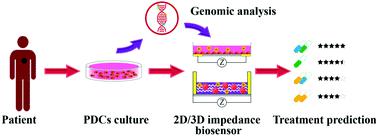当前位置:
X-MOL 学术
›
J. Mater. Chem. B
›
论文详情
Our official English website, www.x-mol.net, welcomes your
feedback! (Note: you will need to create a separate account there.)
A multidimensional biosensor system to guide LUAD individualized treatment
Journal of Materials Chemistry B ( IF 6.1 ) Pub Date : 2021-08-21 , DOI: 10.1039/d1tb00731a Deming Jiang 1, 2 , Yangfeng Shi 2, 3 , Yong Qiu 1, 2 , Xin Liu 1, 2 , Yuxuan Zhu 1, 2 , Jingwen Liu 4 , Yuxiang Pan 5 , Hao Wan 1, 2 , Kejing Ying 2, 3 , Ping Wang 1, 2, 6
Journal of Materials Chemistry B ( IF 6.1 ) Pub Date : 2021-08-21 , DOI: 10.1039/d1tb00731a Deming Jiang 1, 2 , Yangfeng Shi 2, 3 , Yong Qiu 1, 2 , Xin Liu 1, 2 , Yuxuan Zhu 1, 2 , Jingwen Liu 4 , Yuxiang Pan 5 , Hao Wan 1, 2 , Kejing Ying 2, 3 , Ping Wang 1, 2, 6
Affiliation

|
Lung cancer, mainly non-small cell lung cancer (NSCLC), has been a global health problem, leading to maximum cancer death. Across adenocarcinoma patients, significant genetic and phenotypic heterogeneity was identified as responsible for individual cancer drug resistance, driving an urgent need for individualized treatment. High expectation has been set on individualized treatment for better responses and extended survival. There are pressing needs for and significant advantages of testing dosages and drugs directly on patient-specific cancer cells for preclinical drug testing and personalized drug selection. Monitoring the drug response based on patient-derived cells (PDCs) is a step toward effective drug development and individualized treatment. Despite the dependence on optical labels, optical equipment, and other complex manual operation, we here report a multidimensional biosensor system to guide adenocarcinoma individualized treatment by integrating 2D and 3D PDC models and cellular impedance biosensors. The cellular impedance biosensors were applied to quantitate drug response in 2D and 3D environments. Compared with 2D plate culture, 3D cultured cells were found to show higher resistance to anti-cancer drugs. Cell–cell, cell–ECM, and mechanical interactions in the 3D environment led to stronger drug resistance. The in vivo results demonstrated the reliability of the multidimensional biosensor system. Cellular impedance biosensors allow a fast, non-invasive, and quantitative manner for preselected drug screening in individualized treatment. Considering the potential for good distinguishment of different anti-cancer drugs, our newly developed strategy may contribute to drug response prediction in individualized treatment and new drug development.
中文翻译:

指导LUAD个体化治疗的多维生物传感器系统
肺癌,主要是非小细胞肺癌 (NSCLC),一直是一个全球性的健康问题,导致癌症死亡人数最多。在腺癌患者中,显着的遗传和表型异质性被确定为导致个体癌症耐药性的原因,从而迫切需要个体化治疗。人们对个体化治疗寄予厚望,以获得更好的反应和延长生存期。直接在患者特异性癌细胞上测试剂量和药物以进行临床前药物测试和个性化药物选择具有迫切的需求和显着优势。基于患者衍生细胞 (PDC) 监测药物反应是朝着有效药物开发和个体化治疗迈出的一步。尽管依赖光学标签、光学设备等复杂的人工操作,我们在这里报告了一个多维生物传感器系统,通过集成 2D 和 3D PDC 模型和细胞阻抗生物传感器来指导腺癌个体化治疗。细胞阻抗生物传感器用于在 2D 和 3D 环境中定量药物反应。与 2D 平板培养相比,3D 培养的细胞对抗癌药物的耐药性更高。3D 环境中的细胞-细胞、细胞-ECM 和机械相互作用导致更强的耐药性。这 发现 3D 培养的细胞对抗癌药物表现出更高的抵抗力。3D 环境中的细胞-细胞、细胞-ECM 和机械相互作用导致更强的耐药性。这 发现 3D 培养的细胞对抗癌药物表现出更高的抵抗力。3D 环境中的细胞-细胞、细胞-ECM 和机械相互作用导致更强的耐药性。这体内结果证明了多维生物传感器系统的可靠性。细胞阻抗生物传感器允许在个体化治疗中以快速、非侵入性和定量的方式进行预选药物筛选。考虑到区分不同抗癌药物的潜力,我们新开发的策略可能有助于个体化治疗和新药开发中的药物反应预测。
更新日期:2021-09-03
中文翻译:

指导LUAD个体化治疗的多维生物传感器系统
肺癌,主要是非小细胞肺癌 (NSCLC),一直是一个全球性的健康问题,导致癌症死亡人数最多。在腺癌患者中,显着的遗传和表型异质性被确定为导致个体癌症耐药性的原因,从而迫切需要个体化治疗。人们对个体化治疗寄予厚望,以获得更好的反应和延长生存期。直接在患者特异性癌细胞上测试剂量和药物以进行临床前药物测试和个性化药物选择具有迫切的需求和显着优势。基于患者衍生细胞 (PDC) 监测药物反应是朝着有效药物开发和个体化治疗迈出的一步。尽管依赖光学标签、光学设备等复杂的人工操作,我们在这里报告了一个多维生物传感器系统,通过集成 2D 和 3D PDC 模型和细胞阻抗生物传感器来指导腺癌个体化治疗。细胞阻抗生物传感器用于在 2D 和 3D 环境中定量药物反应。与 2D 平板培养相比,3D 培养的细胞对抗癌药物的耐药性更高。3D 环境中的细胞-细胞、细胞-ECM 和机械相互作用导致更强的耐药性。这 发现 3D 培养的细胞对抗癌药物表现出更高的抵抗力。3D 环境中的细胞-细胞、细胞-ECM 和机械相互作用导致更强的耐药性。这 发现 3D 培养的细胞对抗癌药物表现出更高的抵抗力。3D 环境中的细胞-细胞、细胞-ECM 和机械相互作用导致更强的耐药性。这体内结果证明了多维生物传感器系统的可靠性。细胞阻抗生物传感器允许在个体化治疗中以快速、非侵入性和定量的方式进行预选药物筛选。考虑到区分不同抗癌药物的潜力,我们新开发的策略可能有助于个体化治疗和新药开发中的药物反应预测。











































 京公网安备 11010802027423号
京公网安备 11010802027423号